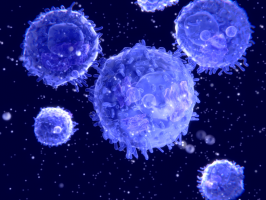
A University of Rochester Wilmot Cancer Institute research team reports that combining a type of radiation therapy with immunotherapy not only cures pancreatic cancer in mice, but appears to reprogram the immune system to create an "immune memory" in the same way that a vaccine keeps the flu away.
The result is that the combination treatment also destroyed pancreatic cells that had spread to the liver, a common site for metastatic disease.
The journal Cell Reports published the study, with Scott Gerber, Ph.D., as corresponding author, and Bradley Mills, Ph.D., a post-doctoral fellow in the Gerber Lab, as first author.
They led a large team of collaborators from the University of Rochester departments of Surgery, Microbiology and Immunology, Pathology and Laboratory Medicine, Radiation Oncology, and Environmental Medicine.
Pancreatic cancer is aggressive and generally has poor survival odds.
It's been in the news this year after "Jeopardy!" host Alex Trebek went public with his diagnosis and treatment.
In more than 80 percent of patients, the cancer is discovered in later stages when surgery is not an option and chemotherapy is usually not effective beyond stabilising the disease.
Pancreatic tumours are notoriously hard to treat because they are surrounded by a toxic stew of proteins and other tissues that protect the cancer cells from the immune system's natural role to attack invaders.
Wilmot researchers looked for an innovative treatment combination that could do two things at once: activate T-cells to attack the cancer and convert the immune-suppressing cells into fighters, the study said.
The combination they used in laboratory models consisted of stereotactic body radiotherapy (SBRT), which delivers high doses of radiation over a short period of time and may also prime the immune system to kill cancer cells; and interleukin-12 (IL-12), which has well-known anti-cancer activity and also activates the immune system.
However, IL-12 often comes with harsh side effects.
To solve that problem, researchers are testing a timed-release technology in a specially designed mouse model for pancreatic cancer, which would slowly deliver the drug over two weeks.
We are an independent charity and are not backed by a large company or society. We raise every penny ourselves to improve the standards of cancer care through education. You can help us continue our work to address inequalities in cancer care by making a donation.
Any donation, however small, contributes directly towards the costs of creating and sharing free oncology education.
Together we can get better outcomes for patients by tackling global inequalities in access to the results of cancer research.
Thank you for your support.